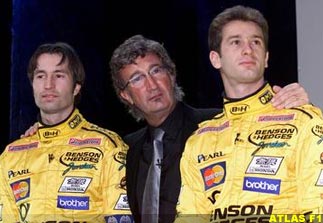 |
Jordan 2000 - the Year of Living Dangerously |
| by Paul Murray, Ireland | |
|
While every year is crucial for the success of a Grand Prix team, 2000 is perhaps the most important yet for Jordan Grand Prix.
1999 was the best year in the nine-year history of the Silverstone-based outfit. Third place in the Constructors' Championship and third place for Heinz-Harald Frentzen in the Drivers' Championship underlined a magnificant season. Expectations will be high in advance of the start of the 2000 season. However, obstacles might lie ahead which could hinder further progression.
While BAR will have the exclusive use of the works Honda, Jordan will press on with the Mugen-Honda powerplant. Aside from the PR-speak, there will certainly be a performance advantage attached to the works Honda as opposed to the Mugen. Pre-season testing has confirmed the reliability of the works Honda and BAR will benefit from superior technical input from the Honda organisation.
Of course a shortage of horsepower does not nesessarily mean an automatic bar to success. In 1993, Ayrton Senna and McLaren worked miracles with the underpowered and older-specification Ford HB V8 powerplant while rivals Benetton enjoyed exclusive use of Ford's Series Seven HB V8. Despite this, Senna won five races that year and finished second in the Drivers' Championship.
It is not so much that BAR's competitiveness will improve dramatically due to Honda's latest generation of V10, but that Jordan will be deprived of the necessary horsepower to challenge Ferrari and McLaren and to fend off Jaguar-Cosworth and BMW-Williams, who could prove worthy adversaries - particularly as the 2000 season progresses.
Eddie Jordan and his team would be foolish to focus only on Ferrari and McLaren and to ignore teams like Jaguar-Cosworth; Formula One is a fickle sport devoid of any certainties. Success in one season is not a guarantee of even the same level of success the next season.
Eddie Jordan has always been a shrewd predictor of up-and-coming talent in the Formula One arena. Examples include Jean Alesi and Michael Schumacher. The Jordan 2000 pairing of Frentzen and Jarno Trulli is one of the strongest on the current grid. A promising combination or two competiting forces who could end up tripping over each other? Frentzen was a revelation in 1999, but bear in mind that he had the benefit of a teammate [Damon Hill] whose best days had been long over. 2000 will be a test of the German's character; Trulli will be a tough prospect, quick, aggressive and deep-thinking, he will be anxious to impress from the start.
In 1997, Jordan's duo of Giancarlo Fischella and Ralf Schumacher had a coming together during that year's Argentinian Grand Prix. Relations between the two for the remainder of the season were strained. If a stronger pairing might have been an asset in 1999, it could be Jordan's undoing in 2000. Strong driver line-ups can prove too difficult to marshal and the potential for teammates to work together can often be lost. A repeat of 1997 is to be avoided at all costs.
On the plus side, Eddie Jordan is one of the few team-principals who can harness the best from a driver, Frentzen's transformation in 1999 owed much to Eddie Jordan's management acumen. Jordan's task for 2000 could be tougher. If Frentzen and Trulli can gel, success should be plentiful. Frentzen showed World Championship winning potantial in 1999, a replication of this in 2000 will see the team make progress with what should be a better car, aerodynamically at least.
Trulli is seen as another potential champion of the future and is probably a better long-term prospect than Giancarlo Fischella, the man most often compared to him. Trulli made his Formula One debut with Minardi in the 1997 Australian Grand Prix, moving to Prost from France until Austria, following Olivier Panis' accident in Canada. Trulli's seven-race spell at Prost in '97 was impressive. The Italian led the opening stages of the Austrian Grand Prix like a veteran, a drive echoing Alain Prost at his best. Sadly, Trulli was ironically halted due to a failed Mugen-Honda engine.
1998 and '99 brought little for Trulli at Prost, the high-point being his second place in last season's European Grand Prix, following a magnificant battle with Rubens Barrichello in the closing stages of the race. A rising star, but it is worth mentioning that the last Italian to win a Grand Prix was Riccardo Patrese in the 1992 Japanese Grand Prix in the Williams-Renault FW14B... In 2000, Trulli will have a chance to rectify this.
|
||||
|
This season will be an interesting one for Jordan. If progress can be made on the technical side, more race-wins and podium-appearances can be anticipated. Mike Gascoyne has proved to be a more than adequate replacement for Gary Anderson, who joined Stewart at the end of 1998. Gascoyne's 2000 creation, the EJ10, should be a race-winner. If Frentzen and Trulli can work together as teammates, much success is possible. If they don't, Eddie Jordan's management skills will be tested to the maximum. The unfortunate aspect to all of this concerns the works Honda V10 engine. Leaving aside corporate considerations, it is likely that Jordan would make better use of what is a fine powerplant than the struggling BAR outfit. Sadly, it may never be known how a works Honda V10 would perform in the back of a Jordan. Worse still, neither might Ferrari nor McLaren. |
The Jordan Dream
Jolly Jordan
The Road to Victory |
|||
| Paul Murray | © 2000 Kaizar.Com, Incorporated. |
| Send comments to: paulomurray@eircom.net | Terms & Conditions |
